- Home
- Sue Grafton
S Is for Silence Page 10
S Is for Silence Read online
Page 10
"A week ago. The place is still a mess," she said, talking over her shoulder as we moved down the hall. "I've got half the boxes unpacked and most things in place, but some of the rooms won't be furnished until god knows when. I need to find a decorator I can get along with. Most are so pushy. Have you ever noticed that?"
"I've never worked with one."
"Well, don't if you can help it."
She walked me through the house, pointing out the obvious: the empty dining room, butler's pantry, eat-in kitchen, mud room, and laundry room. Through the kitchen windows I could see the backyard, which consisted of a poured concrete patio sitting like an island in a sea of raw dirt. Upstairs there were five bedrooms — a master suite, a bedroom for each of the girls, and a guest room, devoid of furniture. She chattered on and on, her prime interest focused on her decorating schemes. I found myself making chirpy, insincere remarks. "Oh, I've always been crazy about Louie the Fourteenth. That'll look great in here."
"You think?"
"Absolutely. You couldn't do better than that."
Tiffany's bedroom walls were painted a pale cream. The furniture was in place, but I got the impression that she wasn't moving in. Her sights were set on the future, when she'd be married and coming back for holidays with her husband and kids in tow. Amber's room was stark purple and had the same unoccupied air. Brittany, at nineteen, still clung to her collection of stuffed animals. The color scheme she'd chosen was pink and white — stripes, checks, and florals. Everything had ruffles, including the dressing table, the bed skirt, and the canopy-that arched over her four-poster bed. Kathy detailed a number of triumphs each of the girls had chalked up, but I'd tuned her out by then.
Tramping down the stairs, I said, "The house is wonderful."
"Thanks. I like it," she said, flashing me a smile.
"What sort of work does your husband do?"
"He sells cars."
"Like your father."
"He works for Daddy."
"Great. I'll introduce myself. I'll be going by the dealership in the next couple of days to chat with your father about Violet. Didn't he sell her that car?"
"Yes, but I doubt he can tell you any more than I can."
"Every little bit helps. It's like working on a jigsaw puzzle without the picture on the box. Right now, I don't even know what I'm looking at."
Returning to the living room, Kathy sat on the couch and I took a matching upholstered chair. She picked up her glass and rattled the ice, drinking off the half an inch of water that had accumulated in our absence.
"How well did you know Violet?" I asked.
"Not well. I was fourteen years old and never had much to do with her. My mother hated her guts. The irony is, six months after Mom died? Daddy married a woman who looked just like Violet — same dyed red hair, same white-trash ways. Caroleena's pushing forty-five, three years younger than me, if you can believe that. I'd hoped it was a phase, but they've been married twenty years so I guess she's here to stay. More's the pity."
I said, "Ah," for lack of anything better.
She caught my tone and said, "It's embarrassing, but what're you going to do? I guess I should be glad he has someone to look after him. Saves me the aggravation. Of course, I'd be willing to bet if he ever gets sick, Caroleena's heading out the door."
"What's the age spread between the two?"
"Thirty-six years."
"Wow."
"'Wow' is right. When they married, he was sixty-one and she was twenty-five. Don't even bother asking me what's in it for her. She lives well and she knows how to get anything she wants," she said, rubbing her thumb against her index finger, indicating money.
I felt my brow lift, wondering if the 'new' Mrs. Cramer would be acing Chet's only daughter out of her inheritance. "What about Violet? You must have had some sense of her."
"Oh, please. I had the same opinions my mother did. She made sure of that. Violet was flashy, but that was about it. Men followed her around like a pack of dogs so I guess she had something. Whatever it was, it went over my head."
"You went to the fireworks that night?"
She straightened the edges of the decorator magazines. "Yes. Liza and I were supposed to go together, but Violet asked her to babysit so that was that. I think Liza went over there at six o'clock to get Daisy bathed and ready for bed."
"Did you happen to see Foley at the park?"
"Sure. For a while, he was talking to my mom. He'd stopped off at the Blue Moon and he was drunk as usual, so he and my mom got into it."
"About what?"
"Who knows?"
"Did you talk to him yourself?"
"Not me. I was scared of him as it was and I didn't want to have anything to do with him."
"Did you ever keep Liza company when she was babysitting?"
"Once in a while. I'm glad Mom never found out, or she'd have had a fit. She was a teetotaler who thought all the evil in the world came out of a bottle."
"What was it about Foley that scared you?"
"What didn't? His violence, his temper, the way he lashed out. With him, you never knew what was coming next. I figured if he was willing to hit Violet, why not Liza or me?"
"Did you ever see him hit Violet?"
"No, but I saw the evidence after the fact. That was good enough for me."
"When did you hear Violet was gone?"
"Sunday morning. I didn't know she was gone gone, but I knew she hadn't come home. Mr. Padgett came over for lunch after church and he was the one who told my mom."
"How'd he hear about it?"
"Town the size of Serena Station, everybody knows everything. Maybe someone noticed the car wasn't parked out front. That would've set tongues to wagging."
"Was there any gossip about who Violet was seeing? Someone must have come under suspicion."
"Not necessarily. Violet was a tramp, so it could have been anyone. Some guy she picked up in a bar."
"I gather it didn't surprise you to think she'd run off."
"Oh, heck no. Not her."
"Even though it meant leaving Daisy behind?"
Kathy made a face. "Daisy was a whiny little brat in those days. And look how they lived. The Sullivans were dirt poor, their house was disgusting, and Foley beat Violet up every chance he could. The better question is why she waited as long as she did."
* * *
I drove from Kathy Cramer's subdivision into Santa Maria proper, where I found a phone booth in the parking lot of a strip mall. I dialed the work number I'd been given for Violet's brother, and the woman who picked up on the other end said, "Wilcox Construction."
"Hi. My name's Kinsey Millhone. I'm trying to reach Calvin Wilcox."
"May I ask what this is in reference to?"
"His sister."
A pause. "Mr. Wilcox doesn't have a sister."
"Maybe not now, but he did. Would you ask him if he can spare a few minutes? I'd like to talk to him."
"Hang on and I'll see if he's in."
I figured she was saying that so she could comfortably claim he was "away from his desk," but the next thing I knew, the man himself picked up the call. "Wilcox."
I went through my spiel again, trying to be succinct since he sounded like a man who liked to get right to the point.
"If you can make it over here in the next half hour, fine. Otherwise, I can't do it until early next week."
"I'll be right there."
* * *
Wilcox Construction was located out on Highway 166, housed in a prefabricated steel building on a narrow lot surrounded by a chain-link fence. Both exterior and interior were utilitarian. At a desk just inside the door, there was a secretary-receptionist whose responsibilities probably included typing, filing, coffee making, and walking the sleeping German shepherd beside her desk. "He's the yard dog," she said, giving him a fond glance. "May look like he's sleeping on the job, but he's called into service once the sun goes down. I'm Babs, by the way. Mr. Wilcox is on a call, but he'll be right
out. You want coffee? It's already made."
"I better not, but thanks."
"Well, have a seat in that case."
She filled her mug from a stainless steel urn, and once she sat down again, her phone gave a chirp. "That's him. You can go on in."
Calvin Wilcox was in his early sixties, wearing a short-sleeve denim work shirt and jeans belted under a modest swell of abdomen. I could see the outline of a hard-pack of cigarettes in his shirt pocket. He had thinning red hair and ginger freckles on his arms. His cheeks were wind-burned, which made his green eyes look electrified in the ruddy glow of his face. I knew I was looking at a male variation of Violet's green eyes and her faux red hair.
We leaned toward each other across the desk to shake hands. He was a big guy, not tall, but solid. He waited until I sat down and then settled in his swivel chair. He tipped it back in what was probably a typical move, one work boot propped on the edge of his desk. He lifted his arms and laced his fingers above his head, which gave him an air of relaxation and openness I doubted was there. Behind him, on the wall, was a black-and-white photograph of him at a construction site. His hard hat shaded his eyes, while the businessmen on each side were bareheaded and squinting. One held a shovel and I assumed the occasion was a ground-breaking ceremony.
He smiled, watching me with a certain shrewdness evident in his eyes. "My sister, Violet. Here she comes again."
"Sorry about that. I know the subject comes up every couple of years."
"I should be used to it by now. What's that old saying? 'Nature abhors a vacuum.' People want closure. Otherwise you're always waiting for the other shoe to drop. How long have you worked for Daisy?"
"Not that long."
"I guess she can spend her money any way she wants, but what's she hope to accomplish?"
"She wants to find her mother."
"Yeah, I get that and then what?"
"That depends on where Violet is."
"Hard to believe it's still bugging her after all this time."
"What about you? Does it bother you?"
"Not a bit. Violet did what suited her. Her life was her business. She seldom consulted me, and if I offered her advice, she'd turn around and do just the opposite. I learned to keep my mouth shut."
"Did she ever talk about Foley beating her?"
"She didn't have to talk about it. It was obvious. He broke her nose, broke her tooth, broke two ribs. I don't know why she put up with it. If she'd wanted out, I'd have helped, but she went back time and time again, so I finally gave up."
"Were you older or younger?"
"Older by two years."
"Any other siblings?"
"Don't I wish. Parents get old, it'd be nice to have someone to help shoulder the burden. Violet wasn't about to do it, that's for sure."
"Are your parents still alive?"
"No. My father had a series of heart attacks in 1951. Three in rapid succession, the last one fatal. The doctors blamed it on a defect he'd carried since birth. He was forty-eight years old. So far I've managed to outlive him by thirteen years. Mother died a couple of years ago, at eighty-four."
"You're married or single?"
"Married. How about yourself?"
"Single, but my parents are both gone."
"You're fortunate. My mother was in a nursing home for years. Well, let's call it a 'facility.' I wouldn't label it a home. She used to phone me six and seven times a week, begging me to come get her. Up to me, I'd have done it, but my wife was adamant. She's a stockbroker. No way would she have given that up in order to take care of Mother. I didn't blame her, but it was tough."
"You have children?"
"Four boys, all grown and gone. Two live here in town. I got one in Reno and another one in Phoenix." He took a quick peek at his watch. "You want to ask about Violet, be quick about it. I got a meeting coming up."
"Sorry. I get curious about people and I forget myself."
"All right with me. It's your call."
"I take it you and Violet weren't close?"
"You got that right. Last time I saw her, she came by the office and asked for money that I was dumb enough to give."
"How much?"
"Two grand. That was the first of July, in case you're wondering. After she left here, she went over to my mother's house and hit her up as well. Mother didn't have much, but Violet managed to wheedle five hundred dollars out of her. Month later, we found out she'd stolen Mother's good jewelry: diamond bracelets, earrings, two pearl necklaces — the works. Three thousand dollars' worth we never saw again."
"How do you know it was her?"
"Mother remembered her asking to use the bathroom, which you could only get to by going through her bedroom. Jewelry box was on the dressing table. Mother didn't have occasion to open it until her birthday that year when Rachel and I were taking her to dinner at the club. She wanted to get all gussied up and that's when she realized everything was gone."
"Did you report it to the police?"
"I wanted to, but she refused. She said if Violet needed it that bad, she could have it."
"Had Violet stolen things before?"
"No, but she borrowed money every chance she got, usually small amounts. She'd claim it was for Daisy so we wouldn't turn her down."
"That seems curious. She bragged about having fifty thousand dollars of her own, which Foley says she got from an insurance settlement. He can't confirm the amount, but he knows she collected."
"She told me the same thing, but I thought it was b.s. If she had that much money, why bother to weasel the two grand from me?"
"Suppose she was putting a stash together so she could take off?"
"Always possible."
"Could she have kept in touch with your mother? I keep thinking that even if she managed to make a new life for herself, she might still want some tie to the past."
"Certainly not with me. Violet didn't have any sentimental attachments that I know of. There's no way Violet could have made contact with Mother without my knowing. For one thing, her number was unlisted, and any mail she got had to go through me first. For a while, the scam artists had her on their radar screens and they were sending her letters proposing 'lucrative' financial schemes or telling her she'd won the lottery and needed to send in the processing fee. She was so gullible she'd give away the furniture if anybody asked."
"And security at the facility was tight?"
"You're thinking Violet could have sneaked in? Forget it. She had no use for Mother beyond ripping her off. Of course, it's irrelevant now since Mother's passed away, but if Violet had managed to make a new life, she wouldn't risk discovery for a woman she didn't give a shit about."
"Any idea where she might have gone?"
"Wherever the road took her. She was a creature of impulse, not one for long-range plans."
"But what's your take on it? You think she's out there somewhere?"
"I never said that. If she were alive, she'd have come back to beg, borrow, or steal what she could. I don't think she went a month without a handout." He took his foot off the desk and leaned in on his forearms. "You want my take on it?"
"Sure, why not?"
"You want to make Daisy happy? Fine. Earn a few bucks for yourself? It's no skin off my nose. But don't turn it into your holy mission in life. You find Violet, you'll only be making trouble."
"For whom?"
"Everyone — and I'm including Daisy in that."
"What do you know that I don't?"
"Nothing. I know Violet. It's just a wild-ass guess."
Chapter 11
* * *
Chet Cramer Chevrolet was located on Main Street in Cromwell, three acres of shiny cars, fifteen capacious service bays, and a two-story showroom with floor-to-ceiling plateglass windows. Inside, at ground level, there were six small glass-fronted offices, each outfitted with a desk, a computer, a run of file cabinets, two chairs for customers, and prominent displays of family photographs and sales awards. One cubicle was c
urrently occupied by a heavyset salesman in earnest conversation with a couple whose body language suggested they were not as eager to do business as he had hoped.
I didn't see a reception desk, but I spotted a sign with an arrow pointing to the parts department. I walked down a short hallway, passing the restrooms and a lounge with comfortable chairs, where two people sat reading magazines. Doughnuts were available and a vending machine dispensed tea, hot chocolate, coffee, cappuccino, and lattes without charge. I found the cashier and told her I had an appointment with Mr. Cramer. She took my name and rang his office to tell him I was there.
While I waited, I wandered back to the showroom floor, moving from a Corvette convertible to a Caprice station wagon. The best-looking car was an Iroc Z Camaro convertible, bright red with a tan interior. The top was down and the leather seats were soft. Try tailing someone in a car that slick. I turned to find Mr. Cramer standing with his hands in his pockets, admiring the car as I did. I knew from counting on my fingers that he was in his early eighties. I could see he'd been handsome in his youth, and I sensed, like an aura, the volume of air he must have displaced before he shrank from age. His suit was a size that a young boy might wear. He said, "What kind of car you drive?"
"1974 VW."
"I'd make you a pitch, but you look like a woman knows her own mind."
"I'd like to think so," I said.
"You're here about Mrs. Sullivan."
"I am."
"Let's go on up to my office. People see I'm down here, I never get a moment's peace."
I followed him across the showroom floor and up the stairs. When we reached his office, he opened the door and stepped aside to let me in. The room was plain — a straight-legged wooden desk, a couch, three chairs, and white walls on which he'd mounted numerous black-and-white photographs of himself with various local bigwigs. The Cromwell Chamber of Commerce had given him a citation for community service. The furniture might well have been the set he started business with. "Did you graduate from college?" he asked as he rounded his desk and took a seat.
I sat down across from him, putting my shoulder bag on the floor at my feet. "Hardly. I had two semesters of junior college, but I don't think that counts."

 S Is for Silence
S Is for Silence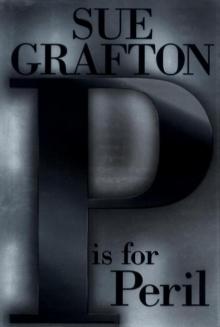 P Is for Peril
P Is for Peril R Is for Ricochet
R Is for Ricochet J Is for Judgment
J Is for Judgment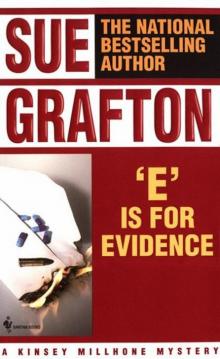 E Is for Evidence
E Is for Evidence T Is for Trespass
T Is for Trespass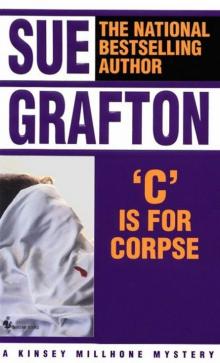 C Is for Corpse
C Is for Corpse U Is for Undertow
U Is for Undertow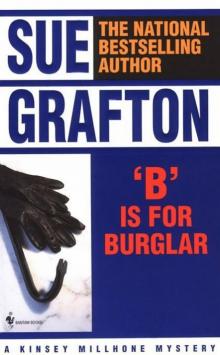 B Is for Burglar
B Is for Burglar Four Sue Grafton Novels
Four Sue Grafton Novels D Is for Deadbeat
D Is for Deadbeat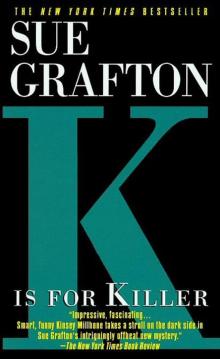 K Is for Killer
K Is for Killer I Is for Innocent
I Is for Innocent A Is for Alibi
A Is for Alibi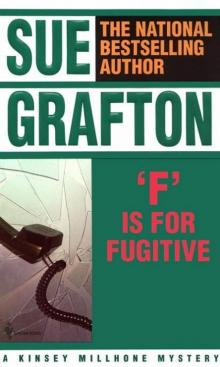 F Is for Fugitive
F Is for Fugitive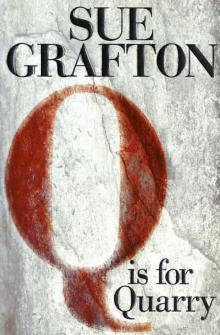 Q Is for Quarry
Q Is for Quarry W Is for Wasted
W Is for Wasted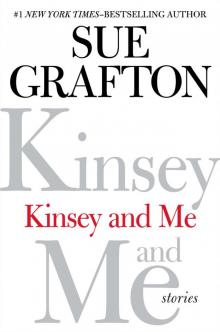 Kinsey and Me: Stories
Kinsey and Me: Stories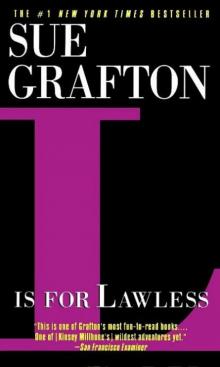 L Is for Lawless
L Is for Lawless Y Is for Yesterday
Y Is for Yesterday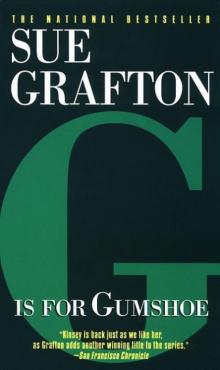 G Is for Gumshoe
G Is for Gumshoe O Is for Outlaw
O Is for Outlaw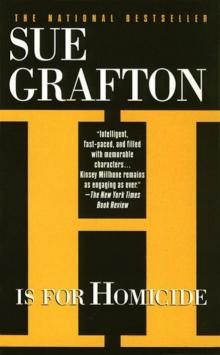 H Is for Homicide
H Is for Homicide X
X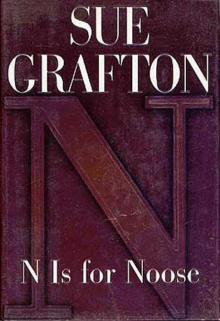 N Is for Noose
N Is for Noose Three Complete Novels: A Is for Alibi / B Is for Burglar / C Is for Corpse
Three Complete Novels: A Is for Alibi / B Is for Burglar / C Is for Corpse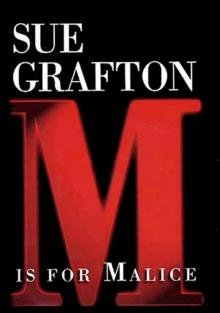 M Is for Malice
M Is for Malice I is for INNOCENT
I is for INNOCENT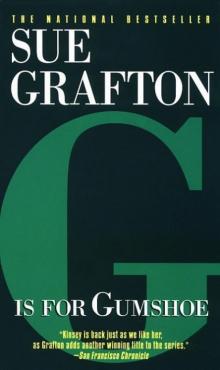 G is for GUMSHOE
G is for GUMSHOE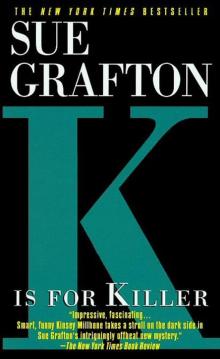 K is for KILLER
K is for KILLER S is for SILENCE
S is for SILENCE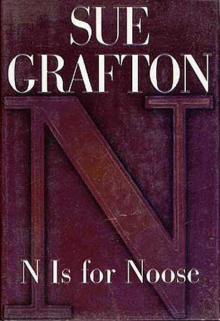 N is for NOOSE
N is for NOOSE D is for DEADBEAT
D is for DEADBEAT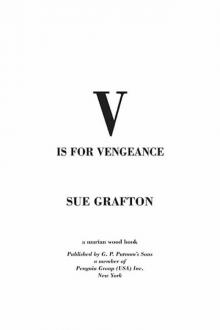 V is for Vengeance
V is for Vengeance U is for Undertow
U is for Undertow W Is for Wasted km-23
W Is for Wasted km-23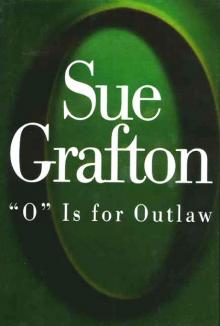 O is for OUTLAW
O is for OUTLAW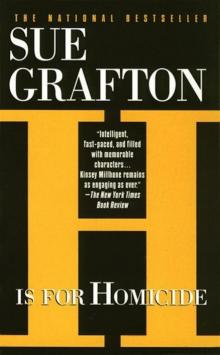 H is for HOMICIDE
H is for HOMICIDE Sue Grafton Novel Collection
Sue Grafton Novel Collection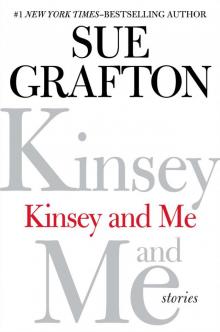 Kinsey and Me
Kinsey and Me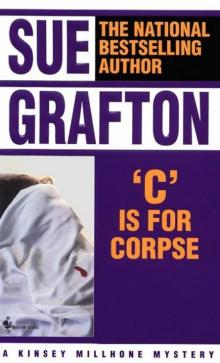 C is for CORPSE
C is for CORPSE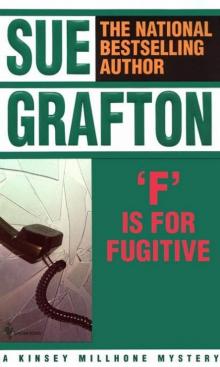 F is for FUGITIVE
F is for FUGITIVE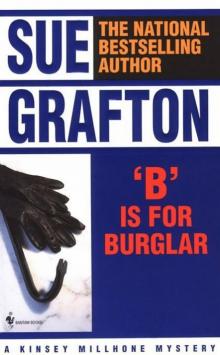 B is for BURGLAR
B is for BURGLAR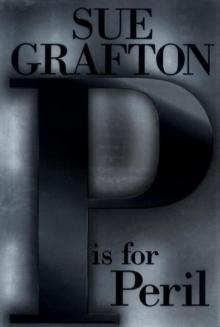 P is for PERIL
P is for PERIL A is for ALIBI
A is for ALIBI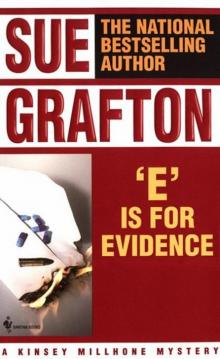 E is for EVIDENCE
E is for EVIDENCE J is for JUDGMENT
J is for JUDGMENT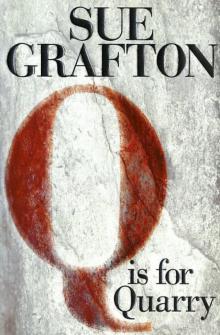 Q is for QUARRY
Q is for QUARRY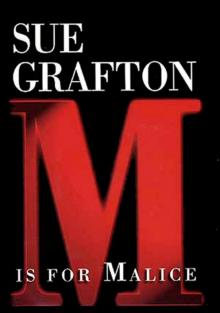 M is for MALICE
M is for MALICE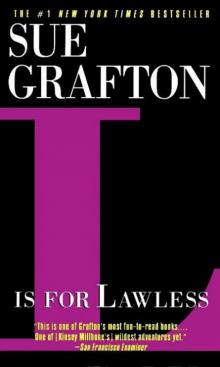 L is for LAWLESS
L is for LAWLESS